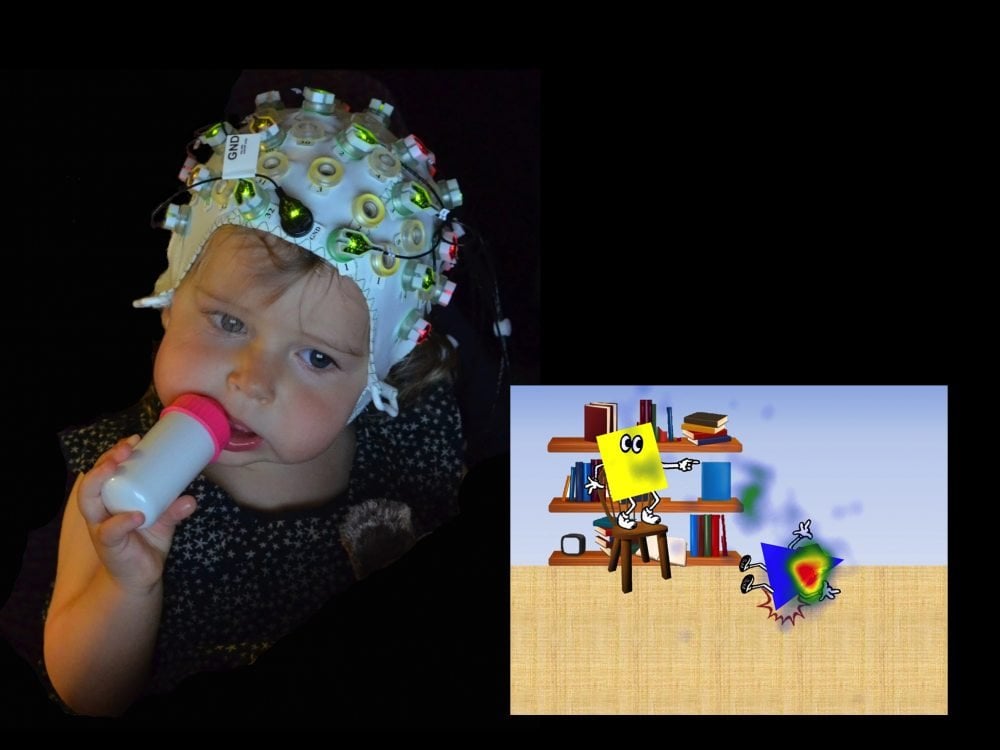Babies’ neural responses to morally charged scenarios are influenced by their parents’ attitudes toward justice, new research from the University of Chicago shows.
The study from Prof. Jean Decety and postdoctoral scholar Jason Cowell, which appears in the Proceedings of the National Academy of Sciences, sheds new light on the mechanisms underlying the development of morality in very young children.
“This work demonstrates the potential of developmental social neuroscience to provide productive, new and exciting directions for the investigation of moral development, by integrating neurobiology, behavior and the social environment,” said Decety, the Irving B. Harris Distinguished Service Professor in Psychology and Psychiatry and the College and director of the University of Chicago Child NeuroSuite.
The developmental neuroscientists found that strong individual differences in the perception of prosocial and antisocial behaviors are present in children as young as 12 to 24 months old—and that these differences are predicted by their parents’ sensitivity to justice. Moreover, parental cognitive empathy is linked to babies’ willingness to share.
“These novel and intriguing findings warrant further investigation to decipher what contributes to such early parent-child transmission of values, which may either be based on biological or socioenvironmental influences, or more likely a dynamic and complex developmental, interactional process between the two,” the authors wrote.
The 73 infants and toddlers who participated in the study watched brief animations depicting prosocial (e.g., sharing, helping) and antisocial (e.g., hitting, shoving) behavior while the authors monitored their eye movement and brain waves using electroencephalography, or EEG.
Following the animations, the developmental neuroscientists presented the babies with toys of the helping and hindering characters and observed their preferences based on reaching. The infants also played a sharing game.
Parents answered questionnaires about their children and themselves to assess their dispositional empathy and sensitivity to justice.

In the current study, all children exhibited larger brain waves in response to prosocial scenes than antisocial ones. In addition, the children were more motivated to look at “good” characters than “bad” ones, as measured by eye tracking. These findings add to a growing body of knowledge demonstrating that children are able to distinguish between prosocial and antisocial behavior from a very early age.
However, the study also suggests that by 1 or 2 years of age, some children perceive the difference between prosocial and antisocial behavior more strongly than others. Importantly, these neural differences also predicted infants’ behavior—the children who reached toward the prosocial character toy also exhibited the greatest neural differentiation between prosocial and antisocial behavior when watching the character animations.
Source: Susie Allen – University of Chicago
Image Source: The image is credited to Jean Decety
Original Research: Abstract for “Precursors to morality in development as a complex interplay between neural, socioenvironmental, and behavioral facets” by Jason M. Cowell and Jean Decety in PNAS. Published online August 31 2015 doi:10.1073/pnas.1508832112
Abstract
Precursors to morality in development as a complex interplay between neural, socioenvironmental, and behavioral facets
The nature and underpinnings of infants’ seemingly complex, third-party, social evaluations remain highly contentious. Theoretical perspectives oscillate between rich and lean interpretations of the same expressed preferences. Although some argue that infants and toddlers possess a “moral sense” based on core knowledge of the social world, others suggest that social evaluations are hierarchical in nature and the product of an integration of rudimentary general processes such as attention allocation and approach and avoidance. Moreover, these biologically prepared minds interact in social environments that include significant variation, which are likely to impact early social evaluations and behavior. The present study examined the neural underpinnings of and precursors to moral sensitivity in infants and toddlers (n = 73, ages 12–24 mo) through a series of interwoven measures, combining multiple levels of analysis including electrophysiological, eye-tracking, behavioral, and socioenvironmental. Continuous EEG and time-locked event-related potentials (ERPs) and gaze fixation were recorded while children watched characters engaging in prosocial and antisocial actions in two different tasks. All children demonstrated a neural differentiation in both spectral EEG power density modulations and time-locked ERPs when perceiving prosocial or antisocial agents. Time-locked neural differences predicted children’s preference for prosocial characters and were influenced by parental values regarding justice and fairness. Overall, this investigation casts light on the fundamental nature of moral cognition, including its underpinnings in general processes such as attention and approach–withdrawal, providing plausible mechanisms of early change and a foundation for forward movement in the field of developmental social neuroscience.
“Precursors to morality in development as a complex interplay between neural, socioenvironmental, and behavioral facets” by Jason M. Cowell and Jean Decety in PNAS. Published online August 31 2015 doi:10.1073/pnas.1508832112






